2015年职称英语考试语法(动词非谓语形式)
- 格式:doc
- 大小:97.00 KB
- 文档页数:10
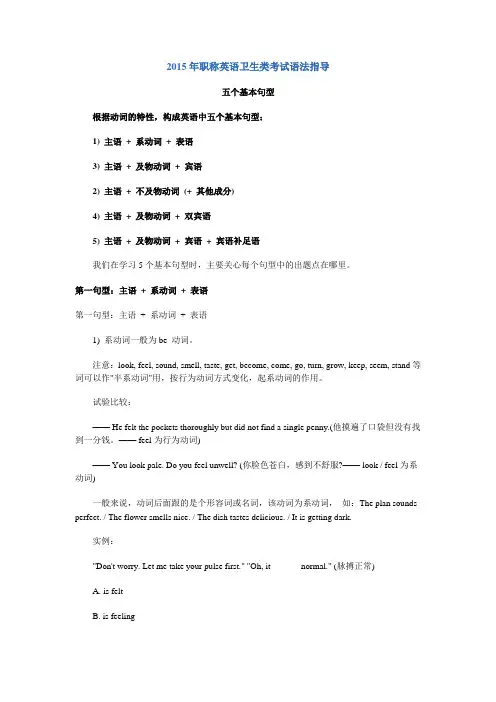
2015年职称英语卫生类考试语法指导五个基本句型根据动词的特性,构成英语中五个基本句型:1) 主语+ 系动词+ 表语3) 主语+ 及物动词+ 宾语2) 主语+ 不及物动词(+ 其他成分)4) 主语+ 及物动词+ 双宾语5) 主语+ 及物动词+ 宾语+ 宾语补足语我们在学习5个基本句型时,主要关心每个句型中的出题点在哪里。
第一句型:主语+ 系动词+ 表语第一句型:主语+ 系动词+ 表语1) 系动词一般为be 动词。
注意:look, feel, sound, smell, taste, get, become, come, go, turn, grow, keep, seem, stand等词可以作"半系动词"用,按行为动词方式变化,起系动词的作用。
试验比较:—— He felt the pockets thoroughly but did not find a single penny.(他摸遍了口袋但没有找到一分钱。
—— feel为行为动词)—— You look pale. Do you feel unwell? (你脸色苍白,感到不舒服?—— look / feel为系动词)一般来说,动词后面跟的是个形容词或名词,该动词为系动词,如:The plan sounds perfect. / The flower smells nice. / The dish tastes delicious. / It is getting dark.实例:"Don't worry. Let me take your pulse first." "Oh, it ______ normal." (脉搏正常)A. is feltB. is feelingC. feelsD. felt解题思路:normal为形容词,前面应为系动词;系动词没有被动语态,故A不对; look, feel, sound, taste, smell, seem等半系动词一般不用进行时,B也不对;D时态错了,故正确答案为C.2)there be是英语中非常重要的一个句型:there是引导词,不解释"那里"; 这是个倒装句, 主语在be动词的后面, be动词的单复数由后面的主语决定。
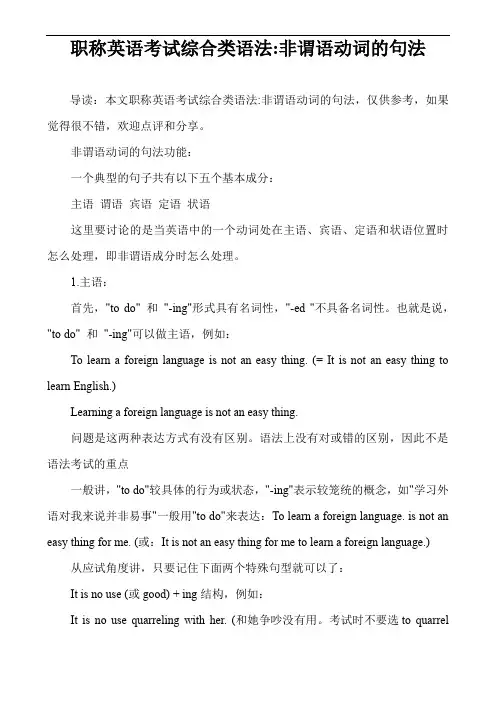
职称英语考试综合类语法:非谓语动词的句法导读:本文职称英语考试综合类语法:非谓语动词的句法,仅供参考,如果觉得很不错,欢迎点评和分享。
非谓语动词的句法功能:一个典型的句子共有以下五个基本成分:主语谓语宾语定语状语这里要讨论的是当英语中的一个动词处在主语、宾语、定语和状语位置时怎么处理,即非谓语成分时怎么处理。
1.主语:首先,"to do" 和"-ing"形式具有名词性,"-ed "不具备名词性。
也就是说,"to do" 和"-ing"可以做主语,例如:To learn a foreign language is not an easy thing. (= It is not an easy thing to learn English.)Learning a foreign language is not an easy thing.问题是这两种表达方式有没有区别。
语法上没有对或错的区别,因此不是语法考试的重点一般讲,"to do"较具体的行为或状态,"-ing"表示较笼统的概念,如"学习外语对我来说并非易事"一般用"to do"来表达:To learn a foreign language. is not an easy thing for me. (或:It is not an easy thing for me to learn a foreign language.)从应试角度讲,只要记住下面两个特殊句型就可以了:It is no use (或good) + ing结构,例如:It is no use quarreling with her. (和她争吵没有用。
考试时不要选to quarrelwith her)There is no + ing 结构,例如:There is no denying that women are playing more and more important roles in the world today.(不可否认,在当今世界上,妇女正发挥越来越重要的作用。
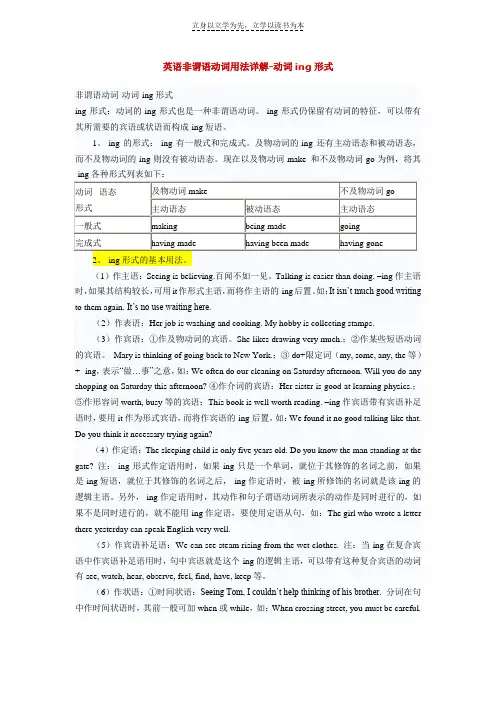
英语非谓语动词用法详解-动词ing形式②原因状语:Being ill, he didn’t go to school yesterday. ③方式或伴随状语:Mary stood at the school gate waiting for Betty.3、主动语态-ing完成式的基本用法。
主动语态-ing完成式所表示的动作发生在句中谓语动词所表示的动作之前,一般在句中作时间或原因状语用。
句中的主语是它的逻辑主语,并且是它所表示的动作的执行者,如:Having answered the letter, she went on to read an English novel.4、被动语态-ing一般式的基本用法。
被动语态-ing一般式所表示的动作是一个正在进行中的被动动作,而且这个被动动作也是和句中谓语所表示的动作同时发生的。
它一般在句中作定语或状语用。
如:The truck being repaired there is ours.5、被动语态-ing完成式的基本用法。
被动语态-ing完成式所表示的动作发生在谓语动词所表示的动作之前,在句中一般作状语用。
如:Having been shown the lab, we were taken to see the library.6、-ing形式的复合结构。
在-ing前加物主代词或名词所有格即构成-ing的复合结构。
其中的物主代词或名词所有格为-ing的逻辑主语。
这种结构在句中可作主语、宾语或表语,如:Your smoking and drinking too much will do harm to your health. 但在口语中,这种结构如作宾语用,其中的物主代词常用人称代词的宾格,名词的所有格常用名词的普通格代替,如:She insisted on Peter’s (or Peter)going there first.7、-ing形式与动词不定式在句中作主语、表语、宾语时的区别。
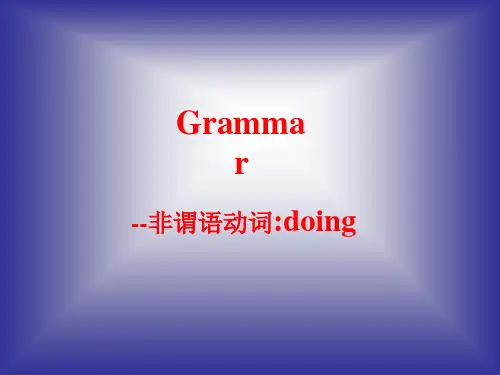
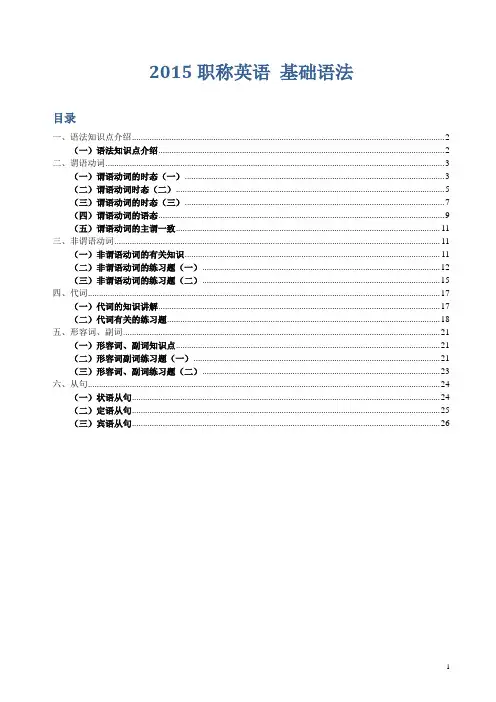
2015职称英语基础语法目录一、语法知识点介绍 (2)(一)语法知识点介绍 (2)二、谓语动词 (3)(一)谓语动词的时态(一) (3)(二)谓语动词时态(二) (5)(三)谓语动词的时态(三) (7)(四)谓语动词的语态 (9)(五)谓语动词的主谓一致 (11)三、非谓语动词 (11)(一)非谓语动词的有关知识 (11)(二)非谓语动词的练习题(一) (12)(三)非谓语动词的练习题(二) (15)四、代词 (17)(一)代词的知识讲解 (17)(二)代词有关的练习题 (18)五、形容词、副词 (21)(一)形容词、副词知识点 (21)(二)形容词副词练习题(一) (21)(三)形容词、副词练习题(二) (23)六、从句 (24)(一)状语从句 (24)(二)定语从句 (25)(三)宾语从句 (26)一、语法知识点介绍(一)语法知识点介绍职称英语中的语法知识点和语法知识直接有关系的题型:1、完形填空;2、完成句子;3、阅读判断4、阅读理解5、补全短文一、动词1、谓语动词(1)时态一般现在时:句子中谓语动词出现动词原形,does, 第三人称单数形式或am/is/are. 一般过去时:谓语动词为过去式:动词+ed,动词的不规则变化,was/were一般将来时:will do过去将来时:would do现在进行时:am/is /are doing过去进行时:was/were doing现在完成时:have/has done(过去分词)过去完成时:had done(2)语态——主动语态和被动再说吧态被动语态的基本形式:一般现在时的被动语态:am/is/are+done一般过去时的被动语态:was/were+done一般将来时的被动语态:will be done过去将来时的被动语态:would be done现在完成时的被动语态:have/has been done过去完成时的被动语态:had been done含有情态动词的被动语态:情态动词+be done(can/may/must…)(3)语序(倒装句)Only+状语+be/情态动词/助动词+主语…否定副词+be/情态动词/助动词+主语…(4)主谓一致主语和谓语动词在量方面保持一致(完形填空和完成句子)名语:不可数名词is可数名词+s are量词:few+可数名词复数谓语动词:are+名词复数A great deal of2、非谓语动词(1)非谓语动词的形式:To doDoDoingDone(2)特殊的动词使,让Look forward to 盼望+doing/名词3、利用字典查答案二、名词和量词1、名词的标志(完形填空和完成句子)2、量词和名词或谓语动词有关。
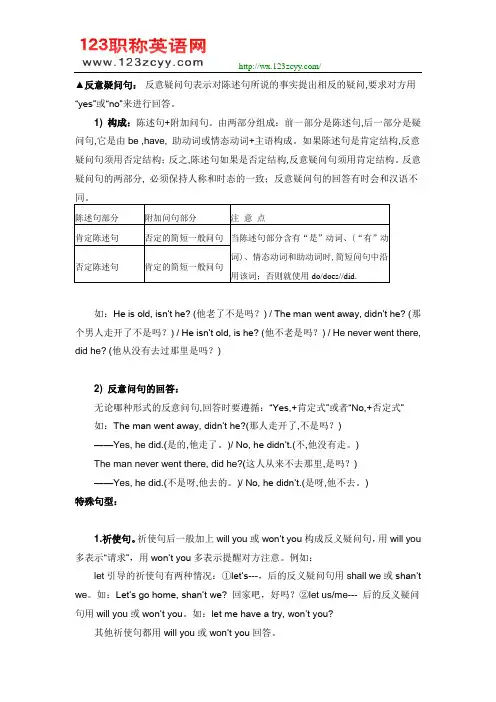
▲反意疑问句:反意疑问句表示对陈述句所说的事实提出相反的疑问,要求对方用―yes‖或―no‖来进行回答。
1) 构成:陈述句+附加问句。
由两部分组成:前一部分是陈述句,后一部分是疑问句,它是由be ,have, 助动词或情态动词+主语构成。
如果陈述句是肯定结构,反意疑问句须用否定结构;反之,陈述句如果是否定结构,反意疑问句须用肯定结构。
反意疑问句的两部分, 必须保持人称和时态的一致;反意疑问句的回答有时会和汉语不如:He is old, isn’t he? (他老了不是吗?) / The man went away, didn’t he? (那个男人走开了不是吗?) / He isn’t old, is he? (他不老是吗?) / He never went there, did he? (他从没有去过那里是吗?)2) 反意问句的回答:无论哪种形式的反意问句,回答时要遵循:―Yes,+肯定式‖或者―No,+否定式‖如:The man went away, didn’t he?(那人走开了,不是吗?)——Yes, he did.(是的,他走了。
)/ No, he didn’t.(不,他没有走。
)The man never went there, did he?(这人从来不去那里,是吗?)——Yes, he did.(不是呀,他去的。
)/ No, he didn’t.(是呀,他不去。
)特殊句型:1.祈使句。
祈使句后一般加上will you或won’t you构成反义疑问句,用will you 多表示―请求‖,用won’t you多表示提醒对方注意。
例如:let引导的祈使句有两种情况:①let’s---,后的反义疑问句用shall we或shan’t we。
如:Let’s go home, shan’t we? 回家吧,好吗?②let us/me--- 后的反义疑问句用will you或won’t you。
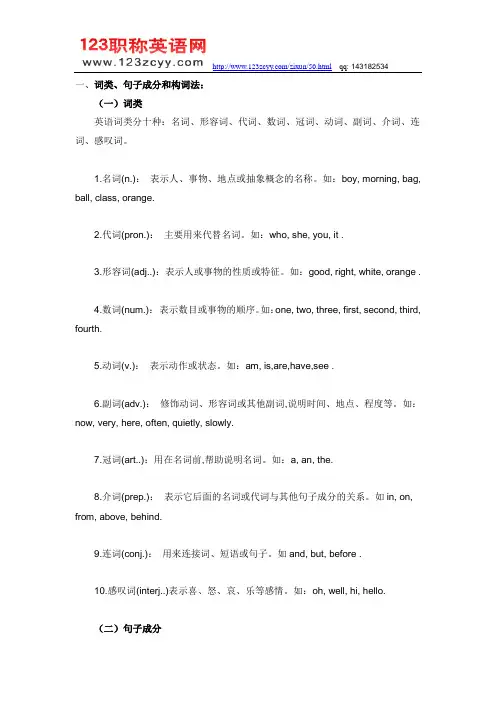
一、词类、句子成分和构词法:(一)词类英语词类分十种:名词、形容词、代词、数词、冠词、动词、副词、介词、连词、感叹词。
1.名词(n.):表示人、事物、地点或抽象概念的名称。
如:boy, morning, bag, ball, class, orange.2.代词(pron.):主要用来代替名词。
如:who, she, you, it .3.形容词(adj..):表示人或事物的性质或特征。
如:good, right, white, orange .4.数词(num.):表示数目或事物的顺序。
如:one, two, three, first, second, third, fourth.5.动词(v.):表示动作或状态。
如:am, is,are,have,see .6.副词(adv.):修饰动词、形容词或其他副词,说明时间、地点、程度等。
如:now, very, here, often, quietly, slowly.7.冠词(art..):用在名词前,帮助说明名词。
如:a, an, the.8.介词(prep.):表示它后面的名词或代词与其他句子成分的关系。
如in, on, from, above, behind.9.连词(conj.):用来连接词、短语或句子。
如and, but, before .10.感叹词(interj..)表示喜、怒、哀、乐等感情。
如:oh, well, hi, hello.(二)句子成分英语句子成分分为七种:主语、谓语、宾语、定语、状语、表语、宾语补足语。
1.主语是句子所要说的人或事物,回答是―谁‖或者―什么‖。
通常用名词或代词担任。
如:I‘m Miss Green.(我是格林小姐)2.谓语动词说明主语的动作或状态,回答―做(什么)‖。
主要由动词担任。
如:Jack cleansthe room every day. (杰克每天打扫房间)3.表语在系动词之后,说明主语的身份或特征,回答是―什么‖或者―怎么样‖。
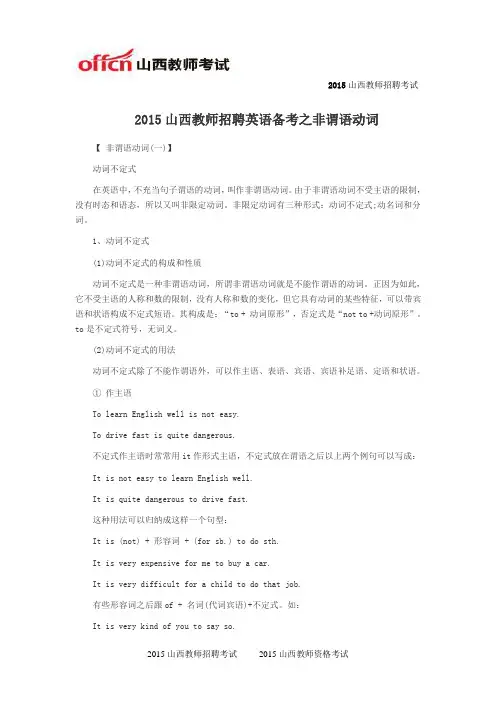
2015山西教师招聘考试2015山西教师招聘英语备考之非谓语动词【非谓语动词(一)】动词不定式在英语中,不充当句子谓语的动词,叫作非谓语动词。
由于非谓语动词不受主语的限制,没有时态和语态,所以又叫非限定动词。
非限定动词有三种形式:动词不定式;动名词和分词。
1、动词不定式(1)动词不定式的构成和性质动词不定式是一种非谓语动词,所谓非谓语动词就是不能作谓语的动词。
正因为如此,它不受主语的人称和数的限制,没有人称和数的变化,但它具有动词的某些特征,可以带宾语和状语构成不定式短语。
其构成是:“to + 动词原形”,否定式是“not to +动词原形”。
to是不定式符号,无词义。
(2)动词不定式的用法动词不定式除了不能作谓语外,可以作主语、表语、宾语、宾语补足语、定语和状语。
①作主语To learn English well is not easy.To drive fast is quite dangerous.不定式作主语时常常用it作形式主语,不定式放在谓语之后以上两个例句可以写成:It is not easy to learn English well.It is quite dangerous to drive fast.这种用法可以归纳成这样一个句型:It is (not) + 形容词 + (for sb.) to do sth.It is very expensive for me to buy a car.It is very difficult for a child to do that job.有些形容词之后跟of + 名词(代词宾语)+不定式。
如:It is very kind of you to say so.2015山西教师招聘考试It is very good of you to come.②作表语。
如:My job is to teach English.The first thing is to ring him up.③作宾语。
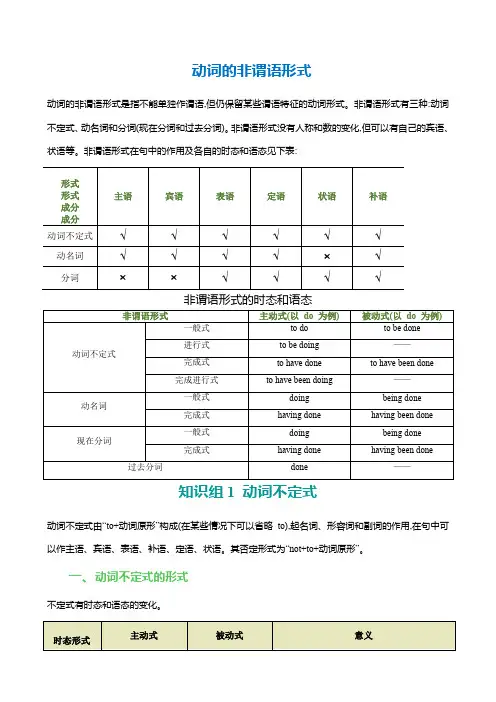
动词的非谓语形式动词的非谓语形式是指不能单独作谓语,但仍保留某些谓语特征的动词形式。
非谓语形式有三种:动词不定式、动名词和分词(现在分词和过去分词)。
非谓语形式没有人称和数的变化,但可以有自己的宾语、状语等。
非谓语形式在句中的作用及各自的时态和语态见下表:非谓语形式的时态和语态知识组1 动词不定式动词不定式由“to+动词原形”构成(在某些情况下可以省略to),起名词、形容词和副词的作用,在句中可以作主语、宾语、表语、补语、定语、状语。
其否定形式为“not+to+动词原形”。
一、动词不定式的形式不定式有时态和语态的变化。
本学期结束前,我有大量的阅读任务要完成。
Bob pretended not to have heard me.鲍勃假装没有听见我说话。
They seemed to be talking about something important.他们似乎在谈论重要的事情。
He is said to have been working in that factory for twelve years.据说他已在那家工厂工作12年了。
不定式修饰的名词或代词和不定式构成逻辑上的主动关系时,不定式往往用主动形式;而不定式修饰的逻辑主语是其所表示的动作的承受者时,一般用不定式的被动式。
例如:I persuaded my brother to change his mind.我说服我弟弟改变了主意。
His first book to be published next month is based on a true story.他下个月将要出版的第一本书是根据一个真实故事写的。
二、动词不定式的语法功能Point 1 作主语不定式作主语相当于名词。
但多数情况下用形式主语it 代替不定式作主语,而把不定式放在句尾,以使句子保持平衡。
例如:To save time is to lengthen life.节约时间就等于延长生命。
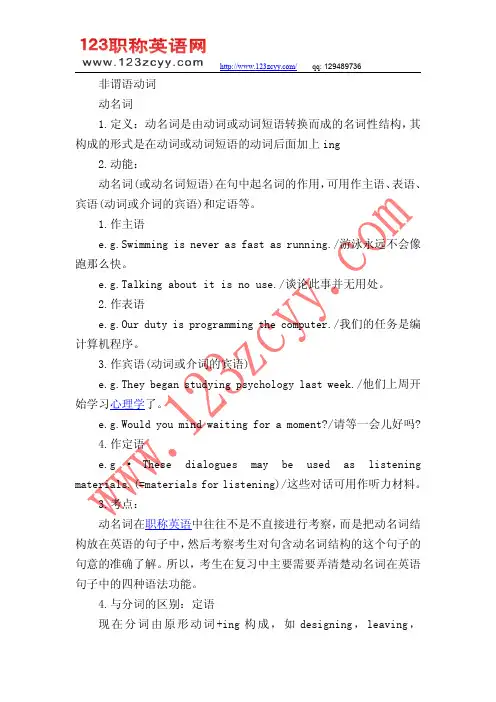
非谓语动词动名词1.定义:动名词是由动词或动词短语转换而成的名词性结构,其构成的形式是在动词或动词短语的动词后面加上ing2.动能:动名词(或动名词短语)在句中起名词的作用,可用作主语、表语、宾语(动词或介词的宾语)和定语等。
1.作主语e.g.Swimming is never as fast as running./游泳永远不会像跑那么快。
e.g.Talking about it is no use./谈论此事并无用处。
2.作表语e.g.Our duty is programming the computer./我们的任务是编计算机程序。
3.作宾语(动词或介词的宾语)e.g.They began studying psychology last week./他们上周开始学习心理学了。
e.g.Would you mind waiting for a moment?/请等一会儿好吗?4.作定语e.g·These dialogues may be used as listening materials.(=materials for listening)/这些对话可用作听力材料。
3.考点:动名词在职称英语中往往不是不直接进行考察,而是把动名词结构放在英语的句子中,然后考察考生对句含动名词结构的这个句子的句意的准确了解。
所以,考生在复习中主要需要弄清楚动名词在英语句子中的四种语法功能。
4.与分词的区别:定语现在分词由原形动词+ing构成,如designing,leaving,stopping等现在分词作定语时,表示正在进行的动作,或经常性的动作,或表示现状。
由此可见现在分词与动名词结构在“形”上相似。
考生需要能区分现在分词作定语和动名词作定语的情况。
Give the note to theloudly-speaking(现在分词作定语)man/请把便条交给坐在正在高声说话的人。
I,d like to buy a washing(动名词作定语)maching.(a machine for washing)/我想要一台洗衣机。
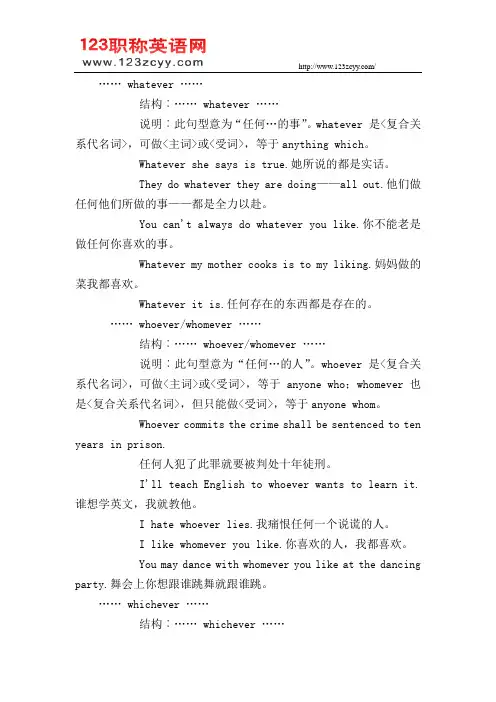
…… whatever ……结构︰…… whatever ……说明︰此句型意为“任何…的事”。
whatever 是<复合关系代名词>,可做<主词>或<受词>,等于anything which。
Whatever she says is true.她所说的都是实话。
They do whatever they are doing——all out.他们做任何他们所做的事——都是全力以赴。
You can't always do whatever you like.你不能老是做任何你喜欢的事。
Whatever my mother cooks is to my liking.妈妈做的菜我都喜欢。
Whatever it is.任何存在的东西都是存在的。
…… whoever/whomever ……结构︰…… whoever/whomever ……说明︰此句型意为“任何…的人”。
whoever 是<复合关系代名词>,可做<主词>或<受词>,等于anyone who;whomever 也是<复合关系代名词>,但只能做<受词>,等于anyone whom。
Whoever commits the crime shall be sentenced to ten years in prison.任何人犯了此罪就要被判处十年徒刑。
I'll teach English to whoever wants to learn it.谁想学英文,我就教他。
I hate whoever lies.我痛恨任何一个说谎的人。
I like whomever you like.你喜欢的人,我都喜欢。
You may dance with whomever you like at the dancing party.舞会上你想跟谁跳舞就跟谁跳。
3.宾语:又称受词,是指一个动作(动词)的接受者。
宾语分为直接宾语和间接宾语两大类,其中直接宾语(经常指被做的人)指动作的直接对象,间接宾语说明动作的非直接,但受动作影响的对象。
一般而言,及物动词后面最少要有一个宾语,而该宾语通常为直接宾语,有些及物动词要求两个宾语,则这两个宾语通常一个为直接宾语,另一个为间接宾语。
(1) 由名词、代词(人称代词要用宾格)、不定式、动名词、(宾语)从句充当,表示动作的承受者是“谁”或者是“何物”。
如:The angel also came to Joseph and told him the same thing.(那个天使同样来到约瑟夫面前并且告诉他同样的事情。
)(代词和名词充当两个宾语) / He told me that the company could not afford to pay him so much money.(他告诉我说公司付不起他那么多的钱。
) (不定式作宾语) / They enjoy watching football games so much that they often forget their lessons. (他们如此喜爱看足球以至于常常忘记了他们的功课。
) (动名词作宾语) / I think to be a children’s doctor is very rewarding.(我认为当个儿童医生是很值得的。
) (从句作宾语)(2) 只有及物动词或介词才有宾语,不及物动词没有宾语,如果涉及到事物,则必须在不及物动词后面加合适的介词。
Listen to the radio. (listen不是及物动词,故加to。
) / Can you hear anything exciting?(你能听到什么令人兴奋的消息吗?)(3) 宾语一般放在及物动词或介词的后面,但是在疑问句中,如果宾语是疑问词,则宾语要放在句首。
介词的宾语如果是疑问词,则可以放在介词后或句首。
职称英语考试综合类语法:非谓语动词实例导读:本文职称英语考试综合类语法:非谓语动词实例,仅供参考,如果觉得很不错,欢迎点评和分享。
下面把非谓语动词中其他几个重要问题用实例说明一下:关于"不定式"作后置状语的举例(注意黑体字部分的表达形式):1) She was so angry as to be unable to speak. (她气得连话都说不出来了。
)2) I don't know her well enough to ask her for help.(我与她不太熟悉,不便请她帮忙。
)3) She was too angry to say anything.(她气得什么都说不出来了。
)4) I'm only too glad to help you.注意与例3)的区别:only too与happy, pleased, glad 等词使用时,表示"非常":我非常愿意帮助你(能帮助你真是太高兴了)。
5) We waited in the train for nearly three hours, only to be told that the appointment had been canceled. (only to…表示意想不到的结果:我们在雨中等了近3个小时,结果被告知约会取消了。
)6) To be fair, he has been working very hard recently.(公平地说,他最近工作一直非常努力。
类似的表达方式还有:to tell the truth(说实话), to be frank(老实说),to go without saying (不用说/ 毫无疑问) 等。
关于分词做后置状语的举例(注意括号中句子的演变过程):1) She received an E-mail from her brother, saying that her mother was seriously ill. (她收到她兄弟发来的一份电子邮件,(邮件上)说她母亲病得很厉害。
一. 基本概念:顾名思义,不担任谓语成分而担任其他语法功能的动词称为非谓语动词,有to do(动词不定式) / -ing (现在分词 / 动名词) / -ed (过去分词) 三个形式。
由于他们不受主语人称和数的限制,故也称为"非限定动词".(学习中不要刻意去区分现在分词和动名词)二. 非谓语动词的时态和语态意义:英语中动词有两大基本特征:时态和语态的变化。
非谓语动词也是动词,当然也具备动词的这两大特征。
1. 时态概念:非谓语动词只有"过去、现在和将来"三个时间概念,他与谓语动词时态的区别是:谓语动词表示的是实际时间概念,如I am learning English.是指讲话的时候或那段时间里"我正在学英语".而非谓语动词的"过去、现在和将来"是指相对于谓语动词而言的"过去、现在和将来",即先于谓语动词的行为或状态称为"过去时",与谓语动词的行为或状态发生在同一时间(段)的称为"现在时",而发生在谓语动词的行为或状态之后的称为"将来时".这个时间概念对于后面要讲的非谓语动词的句法功能是非常重要的。
2. 语态概念:与谓语动词一样,非谓语动词也有主动语态和被动语态之分。
将非谓语动词的上述时态和语态概念用表格归纳如下:也就是要记住四句话:(1) 表示将来时;(2) 表示现在时;(3) 表示过去时(一定是被动的)(4) 动词不定式的完成时表示过去时非谓语动词的上述时态和语态概念是理解非谓语动词句法功能、应试判题和翻译的基础。
请你判断一下,下面句子中的非谓语动词是什么时态和语态:Your duty is to look after the sick child. (你的责任是照料这个病孩。
将来 / 主动)The sick child needs to be looked after by a special person. (这个病孩需要专人照顾。
将来 / 被动)He is said to have studied hard and passed the examination. (据说他学习一直很用功并通过了考试。
过去 / 主动)Five persons are reported to have been killed in the big fire. (据报道,有5人已在这场大火中丧生。
过去 / 被动)Do you know the man sitting and reading a book there? (你认识坐在那里看书的那个人吗?现在 / 主动)Who is the patient being operated on? (正在接受手术的那个病人是谁啊?现在 / 被动)Those elected as committee members will attend the meeting. (当选为委员的人将出席这次会议。
过去 / 被动)有了上述基本概念,就可以进一步讨论下面的问题了:三. 非谓语动词的句法功能:一个典型的句子共有以下五个基本成分:主语谓语宾语定语状语这里要讨论的是当英语中的一个动词处在主语、宾语、定语和状语位置时怎么处理,即非谓语成分时怎么处理。
1.主语:首先,"to do" 和 "-ing"形式具有名词性,"-ed "不具备名词性。
也就是说,"to do" 和 "-ing"可以做主语,例如:To learn a foreign language is not an easy thing. (= It is not an easy thing to learn English.)Learning a foreign language is not an easy thing.问题是这两种表达方式有没有区别。
语法上没有对或错的区别,因此不是语法考试的重点一般讲,"to do"较具体的行为或状态,"-ing"表示较笼统的概念,如"学习外语对我来说并非易事"一般用"to do"来表达:To learn a foreign language. is not an easy thing for me. (或:It is not an easy thing for me to learn a foreign language.)从应试角度讲,只要记住下面两个特殊句型就可以了:It is no use (或good) + ing结构,例如:It is no use quarreling with her. (和她争吵没有用。
考试时不要选to quarrel with her)There is no + ing 结构,例如:There is no denying that women are playing more and more important roles in the world today.(不可否认,在当今世界上,妇女正发挥越来越重要的作用。
)There is no joking about this matter. (这事开不得玩笑。
)2.宾语如上所述,非谓语动词"to do"或"-ing"当主语时,没有特别的语法要求。
但是,当宾语时,就有一个用"to do"还是"-ing"的问题。
大家还记得这个规定吗?如果忘了,请复习"第二讲"中"五个基本句型"的"第三句型".这是考试的一个重点。
在以往的职称考试中,此项一般要占2-3道题目。
关于非谓语动词做宾语补足语的问题,请复习"第二讲"中"五个基本句型"的"第五句型".3.定语也就是做名词的修饰语。
只要牢记本讲"非谓语动词的时态和语态意义"一节中的内容,就不难理解非谓语动词做定语的问题。
非谓语动词做定语,本质上是"定语从句",例如:Where is the house built last year?= Where is the house that(或which)was built last year (去年建造的那栋房子哪儿去了?)Do you see the house being built there ?= Do you see the house that (或which) is being built there?(看见那边那栋正在建造的房子了吗?)The house to be built next month will be our dorm.= The house that (或which) will be built (或that is to be built) next month will be our dorm.(下月要建造的那栋房子将是我们的宿舍。
)也就是说,只要把握好"时间状语"和"语态(先行词与动词的关系)",非谓语动词做定语的考试选项比较容易,出题几率也比较低。
有人可能会问:I have a letter to write 和I have a letter to be written两个句子中的黑体部分都是做"letter"的定语,为什么一个用主动,另一个用被动语态。
一般来说,当动词(write)的行为者就是句子的主语(I)时,用主动语态。
因此,这两个句子的内涵是有些区别的。
但由于考试形式的局限性,一般不会考这种区别的。
4.状语非谓语动词做状语是这一讲的重点,也是考试的重点。
大家还记得"句子的连接"一讲中说过的"逗号不能连接两个句子"这句话和所举的例子吗?错:He is ill, he cannot come to the party this evening.(逗号不能连接两个句子)对:Because he is ill, he cannot come to the party this evening.(使用连接词)对:Being ill, he cannot come to the party this evening.(使用非谓语动词形式)如果:His child is ill, he cannot come to the party this evening. 该怎么改呢?道理是一样的:His child being ill, he cannot come to the party this evening.也就是说,非谓语动词也要有"行为的主体",称为"主格";如果"非谓语动词的行为的主体"与句子的主语不一致,要保留其行为主体(如上句中的"his child"),这种结构称为"(分词)独立主格结构".那么,什么情况用"to do" 、"-ing" 或 "-ed "呢?注意以下两点:(1) 要符合下表的基本要求。
(2) 要注意以下基本用法和思路前置(即放在句子的前面):显然,"to do"做状语形式和意义比较单一,难点是如何区分-ing 和-ed 形式。
下面每个例子说明一条规则,注意理解和记忆(重点不要去区分作什么状语,也不要刻意去翻译句子的意思,重点注意形式的转换和规律):1) When she heard the noise, she went out to see what was happening.Hearing the noise, she went out to see what was happening.规则:当句子的主语(she)与 (非谓语)动词构成主动语态时,只要将实义动词(heard)恢复原形 (hear),后面加ing即可2) When (或 If) the substance is heated to over 200℃, it will give off a poisonous gas.Heated to 200 over 200℃, it (= the substance) will give off a poisonous gas.规则:当句子的主语(it = the substance)与 (非谓语) 动词构成被动语态时,去掉be动词,只保留动词的-ed形式(heated)即可3) As he did not want to hurt her feelings, he did not tell the truth at the moment.Not wanting to hurt her feelings, he did not tell the truth at the moment规则:非谓语动词的否定式是在非谓语动词前面(不是后面)加not构成;其他变化按照例1)或例2)规定4) As she has lived in China for over 20 years, she can speak Chinese fluently.Having lived in China for over 20 years, she can speak Chinese fluently.As they had not finished the lessons, the students had to give up going to see the play.Not having finished the lessons, the students had to give up going to see the play.规则:当句子中出现1)"for + 时间"状语,或2)当一个行为必须在另一个行为结束后才能开始的情况下,应该用"完成式",否定词 "not" 要放在"having"的前面,即"Not having…"提示:当你在考试时分不清是否要用"完成式"时,应倾向于选择有"完成式"的选项。